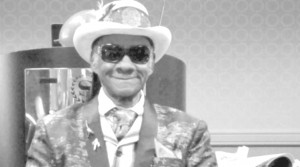Blues icon highlights meeting’s ‘New Lens’ on Black aging research
12th December 2016 · 0 Comments
By Penny Dickerson
Contributing Writer
(Special from Florida Courier/New America Media) — Little Freddie King is a New Orleans blues legend. He’s a self-taught guitar player, who has always used his thumb versus a pick. It allows him to feel the music better. King appeared alert, spry and possessed of the mental facility to fully engage a standing room only audience as he told the story of how he hopped a train from Mississippi to New Orleans when he was merely 14 years old. “The Big Easy” has been his home since.
King, age 76, lives as a statistical example of aging elders, who served as the focus of study at the 2016 Annual Scientific Meeting of the Gerontological Society of America (GSA) held Nov. 16-20 in New Orleans. A field of study often confused with medical geriatrics, gerontology defined is the scientific study of old age, the process of aging and the particular problems of older people. Experts in aging interviewed King for an archive at the Center for Black Music at Chicago’s Center for Black Music Research.

New Orleans icon Little Freddie King, 76 (he’s in Beyonce’s ‘Lemonade’ video), told experts of his life in the blues, at a recent gerontology conference.
A legion of diverse gerontology researchers trained in areas such as physiology, social science, psychology, public health and policy were among those in attendance. In the year 2010, there were 40.2 million aging elders who helped comprise the population. It is estimated that by 2040, that number will rise to 81.2 million with the fastest growth being elders of color.
Additionally, 17.7 percent of African Americans and Latinos are deemed poor or near poor, such as King, whose only income comes from his CD sales. He attributed his healthy outlook on life to staying abreast with trends and keeping to a strict diet.
Eat Right, Be Nice
“I play new music—blues and add a little hip hop and hard rock to help the young people who weren’t around to understand the blues,” said King, who owns a toothless, yet vibrant smile. “I don’t eat any fried food. I cook for myself and eat boiled chicken simmered with a little celery and carrots.”
Most notable is King’s advice to everyone for living and aging with grace: “Stay away from stress. Don’t worry about anything and treat everybody nice – who will let you [treat them nice],” he added.
More than 3,600 scholars, physicians, educators and stakeholders were in attendance at the conference specifically referred to as a “scientific meeting.” Among them were committed African Americans, who led symposiums, presented academic papers and served as panel discussants.
“The Demographic Impact of Minority Aging: America’s Changing Map and the Burden of Stereotypes” and “Eldercare Policy on the Agenda: The Post-Election Prognosis,” are among the titles that make the study of gerontology seem complex yet necessary as the nation faces a new presidential administration.
Shifting Policy
During the eldercare policy presentation, Toni P. Miles, MD, posed the following to attendees, “How many of you live in states that have not expanded Medicaid?” Miles serves as the director of the Institute of Gerontology at the University of Georgia and sought to emphasize two important points.
“Local, local, local. Forget about Washington right now,” stated Miles. “Everything you hear is just wide speculation. The first question you have to answer for yourself is why is your state house red? We are basically living under one party rule everywhere—we have no opposition.”
Miles further emphasized an often overlooked the relevance of Medicare and Medicaid in last year’s 50th anniversary celebration of civil rights legislation.
Medicare, she said, “did two important things: It desegregated hospitals, which allowed African Americans access to better health care.” Along with Medicaid, Medicare also offered a means for most older people to pay for health care for the first time.
More Research Needed
Caregiving, HIV/AIDS, mental health, dementia and elder abuse were each scientifically delved into along with a plethora of more subjects that affect the life course of the aging populous.
“We still need more research,” said Rita B. Choula, senior advisor of long-term services and supports and livable communities for the AARP Public Policy Institute. “AARP is steadily looking for more information on multicultural families, including aging African Americans with complex needs and a high level of care they can’t readily afford.”
According to AARP, the poverty rate for African Americans age 65 and older is more than twice that of all older people (23.9 percent and 10.4 percent, respectively).
In fact, without Social Security benefits, the portion of African Americans 65 and older who fall below poverty would increase from 23.9 percent to 58.2 percent. This data exemplifies the stark reality of aging African Americans whose plight is daunting even when viewed from a “New Lens on Aging,” the official theme of the GSA meeting.
Through new programs and policies, along with continued gerontology research, the current disparities applied to elderly African Americans will reach an equitable standard.
This article originally published in the December 12, 2016 print edition of The Louisiana Weekly newspaper.



